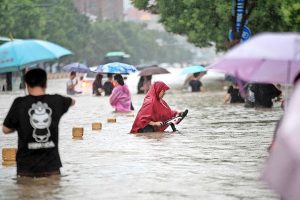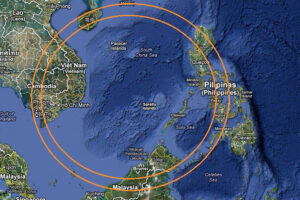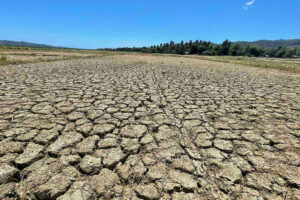Climate emergency declaration awaited from national gov’t

By Kyle Aristophere T. Atienza, Reporter
THE government must declare a climate emergency to wield extraordinary powers that will facilitate a shift to renewable energy, which analysts and economists said will address prevailing problems like the unreliable food supply and the Philippines’ vulnerability to calamities. They said on Sunday that senior officials and the public should initiate wide-ranging discussions on the economic costs of climate change.
“The climate crisis precedes — and is a factor in — many of the issues we are facing today, and so declaring a climate emergency should have been done years ago,” Lea Guerrero, country director of Greenpeace Philippines, said in an e-mail.
President Ferdinand R. Marcos, Jr. said in his first address to Congress that he will work towards a shift to green energy and boost investment in climate-resilient infrastructure.
Mr. Marcos has yet to declare a climate emergency, which would authorize the government to mobilize funds to step up climate mitigation efforts.
Makati City, home to a major business district, declared a climate emergency last week, introducing a plan to put up solar panels in schools and government offices to ensure uninterrupted power services during disasters. It also encouraged the business community to enforce mitigation measures.
The House of Representatives made a similar declaration in 2019, but Greenpeace said “we have not seen the follow-through from our national government.”
“This tells us that a declaration itself isn’t enough — the sitting administration must ensure there is a coherent plan to address the climate crisis with urgency and efficiency,” it said.
“More than 60% of (the Philippine) population is coastal, and the majority of our cities are in coastal areas,” Greenpeace said, noting that extreme weather events and slow-onset impacts of climate change, including ocean heating and acidification, also affect economic performance.
“The World Bank estimates that we spend 0.5% of our gross domestic product on natural disasters annually,” it said.
Citing its own study on rising sea levels, Greenpeace said as much as 80% of Manila could be submerged by 2030, “potentially impacting 87% of its GDP.”
“(Climate change) will further affect not just fisheries and agriculture and livelihoods, but also access to water and secure shelters and homes.”
Renato E. Reside, Jr., an associate professor at the University of the Philippines School of Economics (UPSE), said climate change effects impede economic productivity — a reality that the government should recognize as early as now.
“Climate and environmental problems lead to poor health outcomes which reduce worker and student productivity,” he said in a Messenger chat. “So, the social cost of climate problems is very large and growing. The cost of abatement and cleanup is itself part of the social cost and it is growing too.”
Climate change took its toll on Europe recently, with the region experiencing record-breaking temperatures last month. The European Parliament declared a climate emergency in 2019.
The US has also not been spared from the effects of climate change. Last month, some 100 million Americans from New York City to Las Vegas were under heat warnings as temperatures rose well above 100°F (38°C), Reuters reported.
The US has yet to declare a climate emergency, nor has China. The two economies accounted for 41.89% and 34.75% of world GDP in nominal and purchasing power parity terms, respectively.
Mr. Marcos, 64, needs to collaborate with Congress to implement a massive plan to combat climate change, policy analyst Michael Henry Ll. Yusingco said in an e-mail. “The supermajority support he has in both chambers is a huge plus, but he will still have to deal with various interests and agenda that could dilute his original objective.”
Mr. Yusingco said the President and his team need to provide an evidence-based rationale that can be understood by the public to gain broad support.
“Whether the emergency declaration is as provided for in the constitution or not, a coherent and cogent explanation is very crucial in order to gain public support for the declaration as well as the moves that will follow after it,” he said.
“A lot of sacrifices will be made by the people, so it’s very important that they understand why we are doing this radical step,” he added. “More critically, civil society and the business sector need to be engaged every step of the way.”
Mr. Marcos has said he would make infrastructure more resilient to disasters, vowing to modernize ports and update housing standards.
Terry L. Ridon, convenor of infrastructure think tank InfraWatchPH, said “infrastructure and government projects must be designed to achieve net zero emissions.”
“It means incorporating climate adaptation… in designing various infrastructure projects,” he said in an e-mail. “It means installing solar panels and other renewable energy solutions in unused infrastructure spaces.”
The former legislator said the government needs to determine an appropriate level of climate intervention, “as we are not expected to introduce advanced measures… unlike developed economies.”
“The appropriate level of intervention determines whether low or moderate levels of emissions produced by infrastructure projects remain acceptable in the medium term,” he said. “A higher level of intervention will certainly incur significantly higher immediate costs, and this is a question which both government and the private sector will have to address together.”
Mr. Ridon said the government needs to expand tax and nontax incentives for firms undertaking climate-resilient projects and programs. “This is ‘the only way’ for the private sector to participate in accelerated climate intervention.”
“These incentives should be long-lasting, as the purpose for the incentive, climate intervention and resilience, is a long-term national and international undertaking,” he said.
Mr. Reside of UPSE said the government needs to revisit climate abatement laws and rules, including a policy that provides incentives to businesses that reduce air pollution. “Have they actually abated pollution in any way since they were passed? If so, by how much? No one is doing the math.”
“We already have the Clean Air Act and this law provides tax incentives for pollution abatement, but the take-up of tax benefits from this law in exchange for abatement is very low,” Mr. Reside said. “Climate-targeted financing could also be made available to fund initiatives to protect the environment at various levels of government.”
Greenpeace urged the government to institute a “rapid and just” transition to a low-carbon pathway through a massive uptake of renewable energy solutions.
“It should strengthen energy security starting by scaling up renewable energy targets to at least 50% by 2030, and instituting a blueprint for 100% RE by 2050,” it said.
The government also needs to ratchet up its Nationally Determined Contributions (NDC) under the Paris Agreement, it said. The Philippines has promised a 75% carbon emissions reduction between 2020 and 2030, subject to foreign funding. The reduction target using internal resources is only 2.72%.
Greenpeace also challenged the government to expand coverage of the coal-fired power plant moratorium to include projects in the pipeline and implement a phaseout plan for operating coal projects.
It said businesses should be required to align with the government’s commitments under the Paris Agreement “to address the human rights impacts of climate change.”




